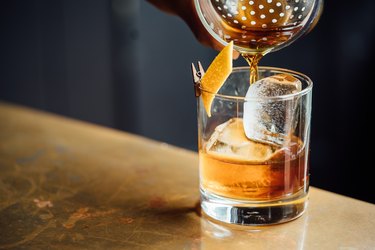
Bourbon is a type of whiskey produced in the United States not exceeding 160 proof. It's made from a fermented mash of no less than 51 percent corn and stored in charred new oak containers, per GovInfo.
Other types of whisky include rye, wheat, malt, which are produced in the same way, though instead of using corn, they're made with rye, wheat, malted barley or malted rye grain. The composition of corn whiskey varies slightly. Rather than containing no less than 51 percent corn, it's composed of at least 80 percent corn grain.
Video of the Day
Video of the Day
Whiskey that's "straight," as in "straight bourbon" or "straight rye" has been stored in charred new oak containers for two years or more. According to GovInfo, "light" whisky is produced in the United States at more than 160 proof. "Blended" whiskey is the result of combining different types of whiskey. Sometimes whiskey is identified not by how it is made, but by where it's made.
Scotch whiskey, for instance, is produced in Scotland, while Irish whiskey is a product of Ireland. Canadian whiskey, as you may have already guessed, is manufactured in Canada.
After a long day, it can be nice to enjoy a drink of bourbon, either neat or on the rocks. However, when you're trying to watch your weight, it's vital to take the calories in that nightcap into account.
Bourbon Nutrition Facts
According to the U.S. National Library of Medicine, alcoholic drinks have little to no nutritional value, so it's best not to look to your shots or pints for your daily vitamin intake. Take a look at the whiskey nutrition facts below before a night on the town.
Calories in Bourbon
There are 1.5 ounces in a shot. One shot of 80-proof bourbon has 97 calories, according to the USDA.
The calories in a shot of whiskey (any type) are the same.
Keep in mind, however, that there are other proof levels available to buy, and the higher number means a higher calorie content. For example, one shot of 100-proof bourbon has 124 calories, per the USDA.
The number of calories will also vary by brand. For example, there are about 103 calories in Maker's Mark bourbon per 1.5-ounce shot. Though that doesn't seem like many calories, going out for a few drinks can easily add up to 500 calories or more.
If you like to mix bourbon with another beverage, such as cola or ginger ale, take into consideration the number of calories in that mixer, too. The calories in gin and other types of distilled spirits are the same as the calories in bourbon and other types of whiskey, as long as there aren't any calorie-containing additions to the bottle.
Carbs in Bourbon
If you're counting carbs rather than calories, rest assured — there are no carbs in bourbon, just like there are no carbohydrates in other non-flavored spirits. (That also means there are 0 grams of carbs in Maker's Mark.)
However, that shouldn't be taken as a license to throw back glass after glass of bourbon, as the calories still count when it comes to weight management, even if your main focus is on cutting back on carbohydrates.
Drink in Moderation
Drinking alcohol can be part of an otherwise healthy diet, as long as it's done in moderation. The Dietary Guidelines for Americans define "moderate" drinking as up to one drink per day for people assigned female at birth (AFAB) and two drinks per day for people assigned male at birth (AMAB).
More specifically, one drink refers to 1.5 ounces (one shot) of distilled 80-proof spirits, such as bourbon. However, don't think you can mix-and-match wine, liquor and beer without thought — a 12-ounce beer or 5-ounce glass of wine also counts as one drink.
The Pros and Cons of Bourbon
While the Dietary Guidelines do not recommend drinking, alcohol such as bourbon might have some potential health benefits. According to the Mayo Clinic, moderate alcohol consumption might reduce the risk of developing heart disease or diabetes, as well as reduce the risk of ischemic stroke, which occurs when the arteries to your brain narrow or become blocked, reducing necessary blood flow.
However, the Mayo Clinic also notes that even light drinkers have an increased risk of certain cancers, including esophageal cancer.
Additionally, heavy drinking carries heavy risks, including higher potential for cancers such as breast and liver cancer, pancreatitis, heart muscle damage, high blood pressure and liver disease.
Alcohol and Weight Gain
A January 2015 study in Current Obesity Reports found that alcohol may be a risk factor for obesity in some individuals, though the evidence is varied.
Moreover, whether or not you gain weight from drinking alcohol can depend on a number of different factors, such as what you drink, how often you drink, genetics, your level of physical activity, your overall diet, age and gender. In fact, a positive association between alcohol and body weight is more likely to be found in people AMAB rather than people AFAB — mostly because people AMAB tend to drink more, according to the report.
While the relationship between alcohol and weight gain isn't completely known, there are a few reasons why they may be related. The first is that alcohol stops your body from burning fat. It's also high in calories, which can add up quickly over the course of one sitting. Moreover, alcohol leads to greater hunger and you're more likely to make poor decisions when it comes to food choices.
- USDA: "Alcoholic Beverage, Distilled, All (Gin, Rum, Vodka, Whiskey) 80 Proof"
- USDA: "Alcoholic Beverage, Distilled, All (Gin, Rum, Vodka, Whiskey) 100 Proof"
- Mayo Clinic: "Alcohol: Weighing Risks and Potential Benefits"
- Dietary Guidelines for Americans
- Current Obesity Reports: "Alcohol Consumption and Obesity: An Update"
Was this article helpful?
150 Characters Max
0/150
Thank you for sharing!
Thank you for your feedback!